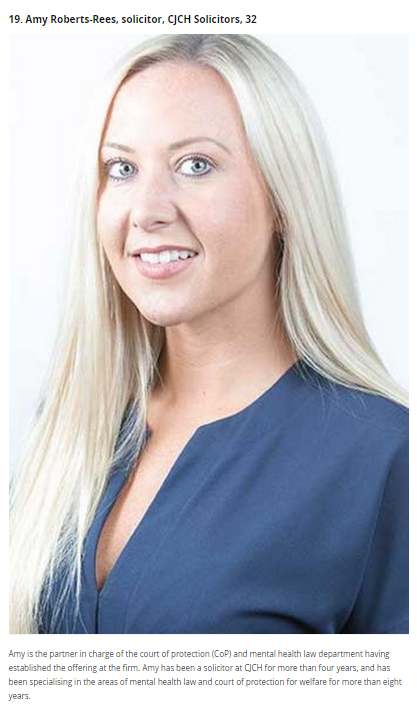Lauren Powell has joined the Residential Conveyancing and Private Client team here at CJCH and wanted to share these tips for first-time home buyers:
As a first time buyer, the legal process of purchasing a property (known as conveyancing) can be a confusing and stressful time.
At CJCH Solicitors, our dedicated team of solicitors are here to make the process as straight forward and stress-free as possible. We have created a brief guide to the steps of the conveyancing process and some of the terminology that is often used to give first-time buyers an initial understanding of the process.
For further information or for a competitive quote for our legal services, please contact a member of our team.
- Step One: your offer is accepted
Congratulations! You have found your property and agreed on a purchase price with the seller.
It is at this stage that the estate agents, seller or developer (in the case of new build properties[1]) may ask for the details of the solicitor you have decided to instruct to act on your behalf.
At CJCH Solicitors, we pride ourselves on providing prompt service. We ensure that once we have provided a quote and agreed our fixed fee[2] with you, we send confirmation of our instruction to you as soon as possible. As this is likely to be the most important financial transaction of your life, it is vital to ensure you choose the right solicitor. A cheap service can often mean a poorer quality service!
Our quote will include information on whether any stamp duty land tax (which applies to properties in England) or land transaction tax (which from April 2018 applies to properties in Wales) is likely to be payable. The rules can be complex, so a chat with one of our team is advised to ensure you know upfront what the costs are likely to be.
At this stage, we also request the contract pack[3] from the seller’s solicitor.
- Step Two: apply for a mortgage/funding your purchase
If you require a mortgage to purchase the property and you have not already made arrangements, it is important to make an application for a mortgage to help fund the purchase and ensure you obtain your agreement in principle[4] as soon as possible.
For new build properties, a Help to Buy Equity Loan[5] in addition to your mortgage could also be a possibility for you. It is best to seek financial advice before agreeing to any mortgage or loan, to ensure you choose the best option for you.
Your lender will request the details of your solicitor. You should receive a copy of your mortgage offer and your solicitor will also be sent a copy by your lender. Your solicitor will normally also represent your lender during the process.
- Step Three: survey and searches
It is always advisable that you commission a survey to ensure a detailed physical inspection of the property is carried out by a professional surveyor to highlight any potential issues. Although this is an extra cost to you, it can save you discovering any nasty surprises in the future!
Please note that if you are purchasing with a mortgage, it will not be enough to rely on your lender’s valuation report as this is done to satisfy your lender that the property is sufficient security for their loan.
Your solicitor will also order search reports[6]. Searches are normally carried out with the local authority, water and drainage provider and an environmental search is usually done (some additional searches can be required depending on the property itself).
Your solicitor raises any enquiries they feel necessary with the seller’s solicitor based on the information provided in the contract pack at the beginning of the process, the search reports received your survey report and any questions you may have for the seller from your physical inspection of the property. When the seller answers the enquiries satisfactorily, it is the time to agree a completion date[7] with all parties involved.
- Step Four: exchange of contracts
Before the day of completion, a process known as ‘exchange of contracts’[8] will take place. The time in between exchange of contracts and the day of completion does vary depending on the circumstances of both the seller and the purchaser (and whether there is a chain[9] involved).
Exchange of contracts is a process that takes place over the phone between the seller’s solicitor and purchaser’s solicitor. Exchange of contracts is the point whereby you become legally bound to purchase and is designed to provide security that completion goes ahead on the agreed date. It is at this stage that you forward your deposit, normally 10% of the purchase price. If you withdrew from the purchase after the exchange of contracts, the deposit is forfeited to the seller. The seller can also face penalties if they withdrew from the sale after the exchange of contracts. Although, parties withdrawing after the exchange of contracts is very rare.
Before exchange of contracts can take place, you will normally meet with your solicitor to sign the necessary documents. You will also be given information on how to transfer the deposit funds to your solicitor, which your solicitor needs to receive before exchange of contracts. Your solicitor will also request your mortgage funds directly from your lender to ensure they arrive in time for the agreed completion date.
On the day of completion, the seller vacates the property (if they have not already done so).
Your solicitor will send the purchase funds to the seller’s solicitors and, on receipt of the funds, the seller’s solicitor will notify your solicitor that the keys can be collected.
The keys are normally collected from the acting estate agents’ office and completion usually takes place around lunchtime, though it will depend on when the funds are received by the seller’s solicitor.
- Stage six: post-completion
Your solicitor will see to the filing of a stamp duty land tax return to HM Revenue and Customs (HMRC) or a land transaction tax return to the Welsh Revenue Authority (WRA) and the payment of any tax that is due on your behalf.[10]
Your solicitor will also register the property in your name with HM Land Registry[11]. When registration is completed, your solicitor will send you an updated version of the title to the property, showing you as the registered owner. If you are purchasing a leasehold property[12], the lease will be registered in your name.
This is often also an important time to consider whether you should make a Will to ensure your property, along with any other assets, would pass in accordance with your wishes. For more information on our Will drafting services and fees, please contact a member of our Private Client department.
Notes:
[1] New build properties are properties that are to be, are in the process of, or have just been built by a developer. The conveyancing process is slightly different when you are purchasing a new build property. Please contact our team for further information.
[2] At CJCH Solicitors, we offer a fixed fee service for conveyancing with no hidden costs. This means that the quote for our legal fees will be for a fixed amount and will not increase, provided no unforeseen work is required (if it is, we agree any further costs with you beforehand).
[3] This will include information on the title to the property, the sale agreement, and forms completed by the seller providing details about the property and its fixtures and fittings, together with supporting documents.
[4] An agreement by your lender to lend a certain amount to you based on the information you have supplied at that stage. A formal application will need to follow to the lender before they formally grant you the loan.
[5] This is a government scheme which could help fund up to 20% of your new build home, leaving you with a 5% deposit to pay (rather than a 10% deposit which is normally required) and a 75% mortgage. There are different rules that apply to properties in England and properties in Wales (Help to Buy and Help to Buy Wales are separate organisations). Please contact us for further information.
[6] Search reports are carried out through an independent search provider. The searches can provide essential information on issues such as the property’s highways, connections to the sewage and water drainage systems, flood/contamination/subsidence risks and planning permission and building regulation documents relating to the property, to name just a few.
[7] The completion date is the date that you finalise the purchase and are able to collect the keys to the property.
[8] You will need to ensure you have a buildings insurance policy in place for the property for this date.
[9] This is where there are a number of linked sales and purchases that are all reliant on one another to complete. Naturally, the longer the chain, the longer the conveyancing process tends to take.
[10] For most purchases, there is a duty to inform HMRC or the WRA of the purchase via a return, even if no tax is payable.
[11] An organisation that registers ownership of property and land in England and Wales.
[12] This is where you have an agreement with a landlord called a lease that, amongst other things, will state how long you will have ownership of a property. The landlord is often the person/organisation that owns the freehold title to the property. At the end of the lease, ownership returns back to the landlord. If you own a freehold title to a property, you basically own the property outright.
 Our specialist Solicitor, Ana Kocmut-Saunders, is on hand to explain the importance of Intellectual Property protection for your business and your brand.
Our specialist Solicitor, Ana Kocmut-Saunders, is on hand to explain the importance of Intellectual Property protection for your business and your brand.


 What are the key things to think about if you have been asked to be an Executor of someone’s Will?
What are the key things to think about if you have been asked to be an Executor of someone’s Will?




 Do you see an upturn in queries to the Employment Team on Blue Monday/ or during January?
Do you see an upturn in queries to the Employment Team on Blue Monday/ or during January?










